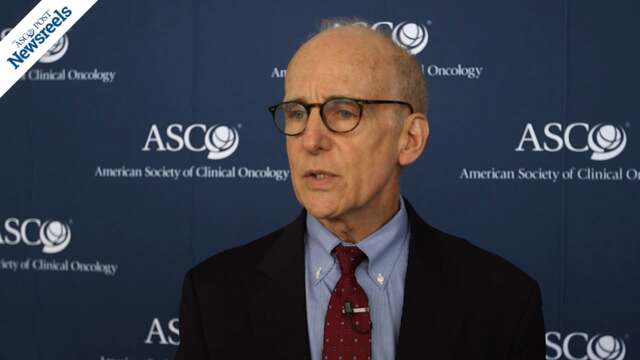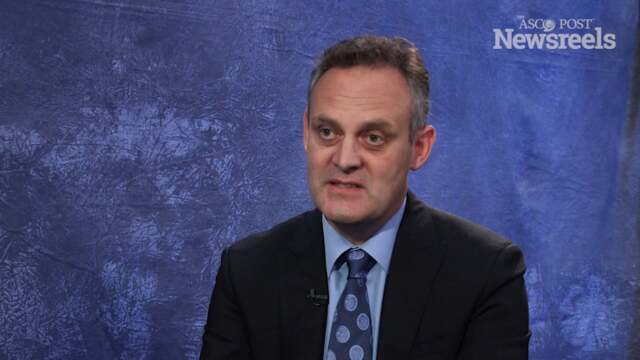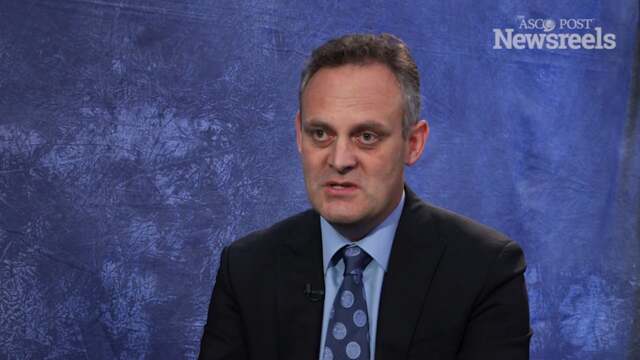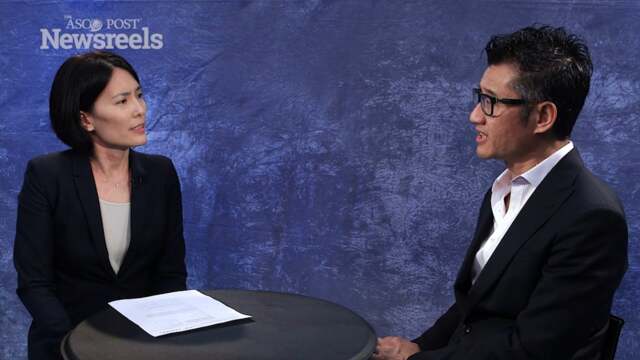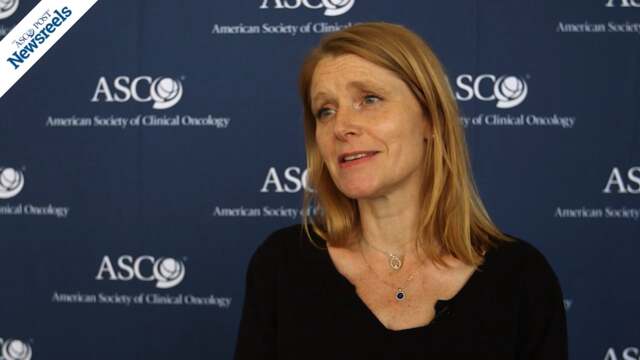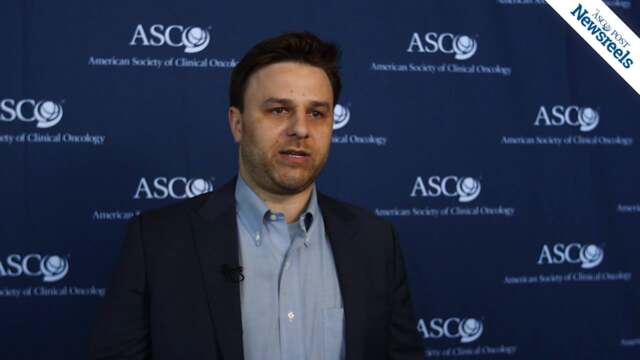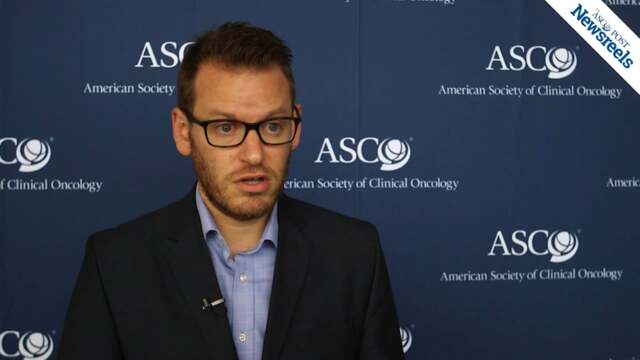Study Finds HER2 Mutations in 3% of Lung Cancers
The Lung Cancer Mutation Consortium at the University of Colorado Cancer Center reported that 24 of 920 patients (3%) with advanced-stage lung cancer in a recent study had mutations in the gene HER2. According to the study, published by Pillai et al in Cancer, 71% of these patients were...
Concurrent Chemotherapy, Proton Therapy May Improve Survival in Patients With Advanced Lung Cancer
For patients with advanced, inoperable stage III lung cancer, concurrent chemotherapy and proton-beam radiotherapy offers improved survival compared to historical data for standard of care, according to a new study from The University of Texas MD Anderson Cancer Center. The research, published by...
Regionalization and Lung Cancer Operative Mortality in Ontario, Canada
In a study reported in the Journal of Clinical Oncology, Bendzsak et al found that centralization of surgery services to high-volume hospitals in Ontario was not independently associated with improved operative mortality rates in lung cancer. In April 2007, a policy was implemented to regionalize...
Expert Point of View: Anne Tsao, MD, and John Heymach, MD, PhD
STUDY DISCUSSANT Anne Tsao, MD, Director of the Mesothelioma Program at The University of Texas MD Anderson Cancer Center in Houston, indicated the response rates seen in the MAPS-2 trial are comparable to those demonstrated in smaller studies of pembrolizumab (Keytruda). She considered the...
Checkpoint Inhibitors May Prove to Be Effective in Mesothelioma
CHECKPOINT INHIBITION was effective against malignant pleural mesothelioma in the MAPS-2 study of the French Cooperative Thoracic Intergroup. At the 2017 ASCO Annual Meeting, researchers reported a disease control rate of up to 50% when patients were treated with immunotherapy after relapse in a...
Prophylactic Cranial Irradiation vs Observation in Extensive-Disease Small Cell Lung Cancer
A Japanese phase III trial has shown no survival benefit of prophylactic cranial irradiation vs observation in patients with extensive-disease small cell lung cancer who had any response to platinum-based doublet chemotherapy and no brain metastases at baseline. These findings were reported in The...
Adding Pravastatin to Chemotherapy in Small Cell Lung Cancer
Following early reports associating favorable outcomes in cancer patients with the use of statins,1,2 further observational studies in this area have provided mixed findings.3 As recently reported in the Journal of Clinical Oncology, and reviewed in this issue of The ASCO Post, Seckl and colleagues ...
No Survival Benefit When Pravastatin Is Added to Standard Chemotherapy in Small Cell Lung Cancer
In a UK phase III study (LUNGSTAR) reported in the Journal of Clinical -Oncology, Michael J. Seckl, MD, PhD, of Imperial College London, and colleagues found that adding pravastatin to first-line standard chemotherapy did not improve overall survival in patients with small cell lung cancer...
FDA Approves First Companion Diagnostic Test to Simultaneously Screen for Multiple NSCLC Therapies
On June 22, the U.S. Food and Drug Administration (FDA) granted premarket approval to Thermo Fisher Scientific for the first next-generation sequencing–based test that simultaneously screens tumor samples for biomarkers associated with three FDA-approved therapies for non–small cell...
Retreatment With Checkpoint Inhibitors May Be Feasible for Some Patients With NSCLC
INCREASING NUMBERS of patients are being treated with checkpoint inhibitors, and about one-quarter to one-third will develop immune-related adverse events. One question on the minds of oncologists is can these patients be safely re-treated once their adverse events resolve? One of the first...
Expert Point of View: John Heymach, MD
"TO PUT THESE RESULTS into context, currently we have three approved epidermal growth factor receptor (EGFR) tyrosine kinase inhibitors for EGFR-positive non–small cell lung cancer (NSCLC): gefitinib (Iressa), erlotinib (Tarceva), and afatinib (Gilotrif). Not many studies have compared these drugs ...
Dacomitinib Outperforms Gefitinib in EGFR-Positive NSCLC
DACOMITINIB, a second-generation epidermal growth factor receptor (EGFR)-targeted tyrosine kinase inhibitor, outperformed gefitinib (Iressa) as first-line treatment for EGFR-positive advanced non–small cell lung cancer (NSCLC) in the phase III ARCHER 1050 study.1 Dacomitinib improved...
European Commission Expands Use of Ceritinib for First-Line Use in ALK-Positive Advanced NSCLC
On June 29, the European Commission approved expanding the use of ceritinib (Zykadia) to include the first-line treatment of patients with advanced non–small cell lung cancer (NSCLC) whose tumors are anaplastic lymphoma kinase (ALK)–positive. Approval follows a positive opinion granted...
First-Line Nivolumab vs Chemotherapy in Advanced NSCLC With PD-L1 Expression ≥ 5%
As reported by Carbone et al in The New England Journal of Medicine, the phase III CheckMate 026 trial has shown no progression-free survival benefit for first-line nivolumab (Opdivo) vs platinum-based chemotherapy in patients with recurrent or stage IV non–small cell lung cancer with...
FDA Grants Regular Approval to Dabrafenib and Trametinib Combination for Metastatic NSCLC With BRAF V600E Mutation
On June 22, 2017, the U.S. Food and Drug Administration granted regular approvals to dabrafenib (Tafinlar) and trametinib (Mekinist) administered in combination for patients with metastatic non–small cell lung cancer (NSCLC) with BRAF V600E mutation as detected by an FDA-approved test. These ...
Atezolizumab as First-Line or Subsequent Treatment in PD-L1–Selected Advanced NSCLC
In the phase II BIRCH trial, atezolizumab (Tecentriq) was found to produce higher response rates as first-line or subsequent therapy in patients with advanced non–small cell lung cancer (NSCLC) with higher levels of programmed cell death ligand 1 (PD-L1) expression. Study findings were...
Expert Point of View: John V. Heymach, MD, PhD
“This is a watershed moment in the treatment of anaplastic lymphoma kinase (ALK)-positive non–small cell lung cancer (NSCLC). Often studies show only incremental improvements with a new treatment. This is different. Alectinib [Alecensa] shows a dramatic increase in efficacy that is also accompanied ...
Alectinib vs Crizotinib in First-Line Treatment of ALK-Positive NSCLC
In 2011, crizotinib (Xalkori) became the first effective targeted therapy for anaplastic lymphoma kinase (ALK)-positive non–small cell lung cancer (NSCLC). Now data from a phase III trial show that alectinib (Alecensa), a second-generation ALK inhibitor, outperformed crizotinib, the current...
Ceritinib vs Chemotherapy in Previously Treated ALK-Rearranged NSCLC
The phase III ASCEND-5 trial has shown a significant improvement in progression-free survival with ceritinib (Zykadia) vs chemotherapy in advanced ALK-rearranged non–small cell lung cancer (NSCLC) previously treated with crizotinib (Xalkori) and chemotherapy. Trial results were reported in...
ASTRO Issues Guideline for Use of Stereotactic Radiation in Early-Stage Lung Cancer
The American Society for Radiation Oncology (ASTRO) has issued a new clinical guideline for the use of stereotactic body radiation therapy (SBRT) in early-stage lung cancer. While SBRT is the current standard of care for peripherally located tumors in patients who cannot undergo surgery, the new...
Sacituzumab Govitecan in Previously Treated Patients With Metastatic NSCLC
As reported by Heist et al in the Journal of Clinical Oncology, the antibody-drug conjugate sacituzumab govitecan showed activity in patients with previously treated metastatic non–small cell lung cancer (NSCLC). Sacituzumab targets Trop-2, present on many solid tumors; govitecan is the...
Atezolizumab: Another Therapeutic Option for Patients With Previously Treated Non–Small Cell Lung Cancer
The OAK study—recently reported by Rittmeyer and colleagues and reviewed in this issue of The ASCO Post—is the first study to show patients with previously treated non–small cell lung cancer (NSCLC) treated with a humanized antibody (atezolizumab, Tecentriq) directed against the programmed cell...
Atezolizumab Improves Overall Survival vs Docetaxel in Previously Treated Non–Small Cell Lung Cancer
In the phase III OAK trial reported in The Lancet by Achim Rittmeyer, MD, of Lungenfachklinik Immenhausen, Germany, and colleagues, treatment with the anti–programmed cell death ligand 1 (PD-L1) antibody atezolizumab (Tecentriq) improved overall survival vs docetaxel in previously treated non–small ...
David H. Henry, MD, on Advances in Lung Cancer, Colorectal Cancer: Expert Perspective
David H. Henry, MD, of Pennsylvania Oncology Hematology Associates, outlines abstracts focusing on chemotherapy in locally advanced rectal cancer and immune-related toxicity, response to anti–PD-L1 blockade, and epacadostat plus pembrolizumab in lung cancer.
Combination Therapy With Pembrolizumab in Metastatic Nonsquamous NSCLC
In the Clinic provides overviews of novel oncology agents, addressing indications, mechanisms, administration recommendations, safety profiles, and other essential information needed for the appropriate clinical use of these drugs. On May 10, 2017, pembrolizumab (Keytruda) was granted accelerated...
FDA Broadens Ceritinib Indication
On May 26, 2017, the U.S. Food and Drug Administration (FDA) granted regular approval to ceritinib (Zykadia), a kinase inhibitor for patients with metastatic non–small cell lung cancer (NSCLC) whose tumors are anaplastic lymphoma kinase (ALK)-positive as detected by an FDA-approved test. In April...
Arnaud Scherpereel, MD, PhD, on Mesothelioma: Results From the IFCT-1501 MAPS2 Trial (French Language Version)
Arnaud Scherpereel, MD, PhD, of the University Hospital of Lille, discusses in French phase II study findings on second- or third-line nivolumab vs nivolumab plus ipilimumab in malignant pleural mesothelioma patients. (Abstract LBA8507)
Arnaud Scherpereel, MD, PhD, on Mesothelioma: Results From the IFCT-1501 MAPS2 Trial
Arnaud Scherpereel, MD, PhD, of the University Hospital of Lille, discusses phase II study findings on second- or third-line nivolumab vs nivolumab plus ipilimumab in malignant pleural mesothelioma patients. (Abstract LBA8507)
Alice Tsang Shaw, MD, PhD, and Tony Mok, MD, on NSCLC: Results From the ALEX and ARCHER 1050 Trials
Alice Tsang Shaw, MD, PhD, of Massachusetts General Hospital, and Tony Mok, MD, of the Chinese University of Hong Kong, discuss their two ASCO-featured abstracts on non–small cell lung cancer: alectinib vs crizotinib in treatment-naive advanced ALK+ disease, and dacomitinib vs gefitinib for first-line treatment of advanced EGFR+ disease. (Abstracts LBA9008 and LBA9007)
ALEX Trial: Alectinib vs Crizotinib in Untreated Advanced ALK-Positive NSCLC
As reported at the recent ASCO Annual Meeting and in The New England Journal of Medicine by Peters et al, the phase III ALEX trial has shown improvement in progression-free survival with alectinib (Alecensa) vs crizotinib (Xalkori) in the first-line treatment of advanced ALK-positive...
Expert Point of View: Trever Bivona, MD, PhD
“The results of this trial are promising but need to be reproduced in the United States and other countries before clear recommendations can be made. There are adjuvant studies such as ALCHEMIST underway to test this strategy in U.S. patients,” said Trever Bivona, MD, PhD, Associate Professor of...
Adjuvant Gefitinib Delays Recurrence in EGFR-Positive NSCLC
Adjuvant therapy with gefitinib (Iressa), an epidermal growth factor receptor (EGFR)-targeted agent, was more successful at preventing recurrence than standard-of-care chemotherapy, in a phase III study of patients with EGFR-positive non–small cell lung cancer (NSCLC).1 Gefitinib extended...
Effect of Previous Radiotherapy on Outcome With Pembrolizumab in NSCLC
In a single-site experience reported in The Lancet Oncology by Shaverdian et al, patients with advanced non–small cell lung cancer (NSCLC) in the phase I KEYNOTE-001 trial of pembrolizumab (Keytruda) were found to have better outcomes if they had received prior radiotherapy. Study Details...
ASCO 2017: Research Suggests Possible New Treatment for EGFR-Positive Lung Cancer
Findings from a phase III clinical trial point to a potential new treatment for patients newly diagnosed with advanced, epidermal growth factor receptor (EGFR)-positive non–small cell lung cancer (NSCLC). Compared to the EGFR inhibitor gefitinib (Iressa), one of the standard targeted...
ASCO 2017: Early Research Suggests First Immunotherapy for Mesothelioma on the Horizon
Malignant pleural mesothelioma is a rare cancer, but its incidence has been rising. This cancer is usually associated with asbestos exposure, and patients have a median life expectancy of only 13 to 15 months. All patients relapse despite initial chemotherapy, more than 50% of them within 6 months...
Solange Peters, MD, PhD, on SCLC: Expert Perspective on CheckMate 032
Solange Peters, MD, PhD, of the University of Lausanne, examines the study findings on nivolumab ± ipilimumab in advanced small cell lung cancer, in the first report of a randomized expansion cohort. (Abstract 8503)
Taofeek K. Owonikoko, MD, PhD, on SCLC: Results of the ECOG-ACRIN 2511 Trial
Taofeek K. Owonikoko, MD, PhD, of Emory University, discusses study findings on cisplatin and etoposide in combination with veliparib or placebo for extensive stage small cell lung cancer. (Abstract 8505)
Matthew D. Hellmann, MD, on SCLC: Results From CheckMate 032
Matthew D. Hellmann, MD, of Memorial Sloan Kettering Cancer Center, discusses study findings on nivolumab ± ipilimumab in advanced small cell lung cancer, in the first report of a randomized expansion cohort. (Abstract 8503)
ASCO 2017: ALEX Study: Alectinib Halts Lung Cancer Growth More Than a Year Longer Than Crizotinib
Findings from a phase III clinical trial point to a more effective initial treatment for patients with ALK-positive non–small cell lung cancer (NSCLC). Compared to the current standard of care, crizotinib (Xalkori), the newer ALK inhibitor alectinib (Alecensa) halted cancer growth for a...
Daniel A. Goldstein, MD, on Pembrolizumab for Lung Cancer: Saving Costs by Adjusting Dosage
Daniel A. Goldstein, MD, of Emory University and Rabin Medical Center, discusses his study findings that show nearly $1 billion in savings when patients receive personal weight-based doses instead of a predetermined fixed dose for treatment of PD-L1-positive non–small cell lung cancer. (Abstract 9013)
Taofeek K. Owonikoko, MD, PhD, on SCLC: Results of the ECOG-ACRIN 2511 Trial
Taofeek K. Owonikoko, MD, PhD, of Emory University, discusses study findings on cisplatin and etoposide in combination with veliparib or placebo for extensive stage small cell lung cancer. (Abstract 8505)
ATS 2017: Among All Cancers, Lung Cancer Appears to Put Patients at Greatest Suicide Risk
A lung cancer diagnosis appears to put patients at the greatest risk of suicide when compared to the most common types of non-skin cancers, according to new research presented at the 2017 American Thoracic Society International Conference (Abstract 8321). Researchers analyzed 3,640,229 patients in ...
Japanese Phase III Trial of Alectinib vs Crizotinib in ALK-Positive NSCLC
The Japanese phase III J-ALEX trial has shown improved progression-free survival with alectinib (Alecensa) vs crizotinib (Xalkori) in ALK inhibitor–naive patients with ALK-positive non–small-cell lung cancer (NSCLC). Results were reported by Hida et al in The Lancet. Study Details In...
FDA Broadens Ceritinib Indication to Previously Untreated ALK-Positive Metastatic NSCLC
On May 26, 2017, the U.S. Food and Drug Administration (FDA) granted regular approval to ceritinib (Zykadia) for patients with metastatic non–small cell lung cancer (NSCLC) whose tumors are anaplastic lymphoma kinase (ALK)-positive as detected by an FDA-approved test. In April 2014,...
ASCO President, Bruce E. Johnson, MD, FASCO, Participates in Key Research With EGFR Mutation in Lung Cancer
Bruce E. Johnson, MD, FASCO, 2017–2018 ASCO President, was born in St. Peter, Minnesota, and grew up on a rural dairy farm. “Neither of my parents had college degrees, but working on a dairy farm with them gave me a solid work ethic. I was working outside on the farm before I was 10 years old. In...
Precision Medicine and My Own Activism Are Keeping Me Alive
In 2009, I was living my dream. My work as a business development manager for a technology company was thriving; I had a satisfying social life; I was active in sports, especially hiking and biking; and I was involved in social justice causes as a volunteer at San Quentin State Prison, helping...
Osimertinib in Metastatic EGFR T790M–Mutant NSCLC After EGFR Inhibitor Therapy
On March 30, 2017, osimertinib (Tagrisso) was granted regular approval for the treatment of patients with metastatic epidermal growth factor receptor (EGFR) T790M–mutant non–small cell lung cancer (NSCLC), as detected by a U.S. Food and Drug Administration (FDA)-approved test, who have progressed...
The Ongoing Challenges of Lung Cancer Screening
Lung cancer persistently remains the leading cause of cancer death among men and women in the United States. Only about 15% of lung cancers are diagnosed at the localized stage, when clinical intervention could markedly improve patient outcomes. For decades, lung cancer specialists and advocacy...
NCCN Clinical Practice Guidelines in Oncology (NCCN Guidelines®): 2017 Guidelines
NCCN Clinical Practice Guidelines in Oncology (NCCN Guidelines®): 2017 Guidelines In 1996, the National Comprehensive Cancer Network® (NCCN®) published its first set of Clinical Practice Guidelines in Oncology®, covering 8 tumor types. Guidelines are now published for more than 60 tumor types and...
Lung Cancer: Hope From Science
The following essay by Paul A. Bunn, Jr, MD, is adapted from The Big Casino: America’s Best Cancer Doctors Share Their Most Powerful Stories, which was coedited by Stan Winokur, MD, and Vincent Coppola and published in May 2014. The book is available on Amazon.com and thebigcasino.org. I grew up in ...
